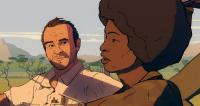 Em Mais um Dia de Vida, encontramos uma estética hollywoodesca, de construção e celebração do herói Kapuscinski. Terá a mais valia de dar a conhecer a outros públicos (em particular ao mais jovem, pelo estilo de filme de ação) o xadrez político regional e internacional que se jogava em Angola. Porém, ao centrar a narrativa de forma tão redutora na figura do ‘herói jornalista’, o filme não responde à evocação de Carlota, ficando suspenso num jogo dúbio de uso (e abuso) da memória e do esquecimento.
Em Mais um Dia de Vida, encontramos uma estética hollywoodesca, de construção e celebração do herói Kapuscinski. Terá a mais valia de dar a conhecer a outros públicos (em particular ao mais jovem, pelo estilo de filme de ação) o xadrez político regional e internacional que se jogava em Angola. Porém, ao centrar a narrativa de forma tão redutora na figura do ‘herói jornalista’, o filme não responde à evocação de Carlota, ficando suspenso num jogo dúbio de uso (e abuso) da memória e do esquecimento.
Afroscreen
21.01.2019 | by Hélia Santos
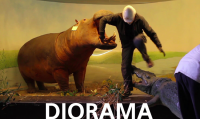 “Palimpsest of the Africa museum” documents the moving of the Africa museum as an esthetic mourning process, shows the insanity of the alterations and reveals through the eyes of the Belgian African Diapsora what the renovation really puts at stake: the decolonization of the Self.
“Palimpsest of the Africa museum” documents the moving of the Africa museum as an esthetic mourning process, shows the insanity of the alterations and reveals through the eyes of the Belgian African Diapsora what the renovation really puts at stake: the decolonization of the Self.
Afroscreen
11.01.2019 | by Matthias De Groof
 This reusing of the past requires us to reflect on how traumatic histories are collectively absorbed, and on how histories can be revised, even distorted, when they are reread. When the past is reused, its image is reinscribed through the prism of a particular, usually other, ideology with the intention of evoking a particular past and creating its counter image. This manoeuvre often has hegemonic ambitions, and aims to impact public opinion.
This reusing of the past requires us to reflect on how traumatic histories are collectively absorbed, and on how histories can be revised, even distorted, when they are reread. When the past is reused, its image is reinscribed through the prism of a particular, usually other, ideology with the intention of evoking a particular past and creating its counter image. This manoeuvre often has hegemonic ambitions, and aims to impact public opinion.
To read
02.01.2019 | by Roberto Vecchi
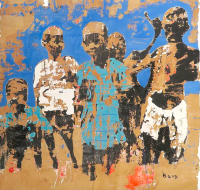 In his view, “either a society is racist or it is not” and “colonial racism is no different from other racisms.” It is when he tries to explain a key idea and expose a scandal that his poetic and rhetorical prose unfolds. Besides, for him, the liberation of the native means rejecting this interdicted world and embracing the “self” denied by the colonizer, who sees him as disorganised and docile: “The native is a being hemmed in; apartheid is simply one form of the division into compartments of the colonial world.
In his view, “either a society is racist or it is not” and “colonial racism is no different from other racisms.” It is when he tries to explain a key idea and expose a scandal that his poetic and rhetorical prose unfolds. Besides, for him, the liberation of the native means rejecting this interdicted world and embracing the “self” denied by the colonizer, who sees him as disorganised and docile: “The native is a being hemmed in; apartheid is simply one form of the division into compartments of the colonial world.
Mukanda
01.01.2019 | by Anne Mathieu
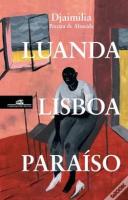 What Djaimilia Pereira de Almeida writes can be understood as a powerful transformation tool regarding the Portuguese human landscape. With it, the painful fragments of a history made up of frustrations and disappointments, of ruptures and withdrawals and of ambiguous felling are not erased, instead they are reunited in a healing coexistence.
What Djaimilia Pereira de Almeida writes can be understood as a powerful transformation tool regarding the Portuguese human landscape. With it, the painful fragments of a history made up of frustrations and disappointments, of ruptures and withdrawals and of ambiguous felling are not erased, instead they are reunited in a healing coexistence.
To read
01.01.2019 | by Inocência Mata
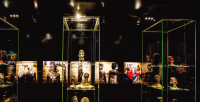 The discussion about the restitution of ethnographic works – be them artistic, documental or human remains – to the countries of origin is not new, but regained prominence two weeks ago with the announcement of Emmanuel Macron’s decision to return a bronze collection to Benin, from where the artworks were taken at the end of the 19th century in a punitive military expedition against the kingdoms of west Africa.
The discussion about the restitution of ethnographic works – be them artistic, documental or human remains – to the countries of origin is not new, but regained prominence two weeks ago with the announcement of Emmanuel Macron’s decision to return a bronze collection to Benin, from where the artworks were taken at the end of the 19th century in a punitive military expedition against the kingdoms of west Africa.
To read
29.12.2018 | by vários
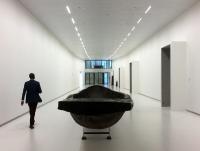 Three options emerged for the museum’s “reorganization”. First, there was the possibility of clearing the museum’s contents and reopening as an empty museum. Second, there was the option of destroying the museum and building a new one. The third tabled choice was to come up with a reinvented museology that would engage with the museum’s history to present a critical view of colonialism.
Three options emerged for the museum’s “reorganization”. First, there was the possibility of clearing the museum’s contents and reopening as an empty museum. Second, there was the option of destroying the museum and building a new one. The third tabled choice was to come up with a reinvented museology that would engage with the museum’s history to present a critical view of colonialism.
To read
23.12.2018 | by António Pinto Ribeiro and Margarida Calafate Ribeiro
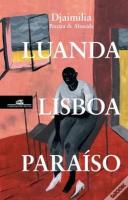 Their story becomes the usual story of many immigrants coming from the old colonies in search of medical treatment or of a better life. In Angola, Cartola was a midwife. In Lisbon, he became a construction janitor, and the city made him indecisive and gloomy. Aquiles, who was still a teenager when he switched country, no longer felt Angolan.
Their story becomes the usual story of many immigrants coming from the old colonies in search of medical treatment or of a better life. In Angola, Cartola was a midwife. In Lisbon, he became a construction janitor, and the city made him indecisive and gloomy. Aquiles, who was still a teenager when he switched country, no longer felt Angolan.
To read
23.12.2018 | by Tatiana Salem Levy
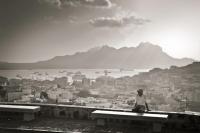 brain drain is a problem. Emigration in Cape Verde is not a bed of roses. In fact, it has created a serious problem of brain drain. One common situation involves young students who decide to study abroad (in Portugal, for example) and do not return to Cape Verde after completion of their university education. According to data between 1997/98 and 2002/2003, about 77% of students (around 5,382) left the country and did not return.
brain drain is a problem. Emigration in Cape Verde is not a bed of roses. In fact, it has created a serious problem of brain drain. One common situation involves young students who decide to study abroad (in Portugal, for example) and do not return to Cape Verde after completion of their university education. According to data between 1997/98 and 2002/2003, about 77% of students (around 5,382) left the country and did not return.
To read
16.12.2018 | by Cláudia Rodrigues
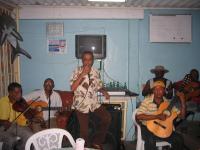 They arrived in Angola 100 years ago. They witnessed the decline of a colonial power that instrumentalized them and the birth of the Angolan nation. The memory of Cape-Verdean immigrants in our country tells a story of oppression and resistance that the creole sociologist Nardi Sousa salvaged and is to publish in a book.
They arrived in Angola 100 years ago. They witnessed the decline of a colonial power that instrumentalized them and the birth of the Angolan nation. The memory of Cape-Verdean immigrants in our country tells a story of oppression and resistance that the creole sociologist Nardi Sousa salvaged and is to publish in a book.
To read
13.12.2018 | by Pedro Cardoso
 Cape Verde is not Africa, Cape Verdeans are “special blacks” and the closest to Portugal. Cape Verde is the country of miscegenation, the “proof” of “racial harmony” of Luso-Tropicalism. For many years, this was the dominant narrative. To be or not to be African continues to be a question.
Cape Verde is not Africa, Cape Verdeans are “special blacks” and the closest to Portugal. Cape Verde is the country of miscegenation, the “proof” of “racial harmony” of Luso-Tropicalism. For many years, this was the dominant narrative. To be or not to be African continues to be a question.
To read
04.12.2018 | by Joana Gorjão Henriques
 We have a lot in common, much more than “having shared the same kind of love”. In what concerns the rights of women, we have an oppression and social injustice past and present in common. We are both oppressed in the sense that we don’t have the power of decision over our own bodies; we cannot decide whether to get out of an exploitative relationship or not because society, family, church, culture, traditions will tell you that you need to put up with it and stop “rebelling”.
We have a lot in common, much more than “having shared the same kind of love”. In what concerns the rights of women, we have an oppression and social injustice past and present in common. We are both oppressed in the sense that we don’t have the power of decision over our own bodies; we cannot decide whether to get out of an exploitative relationship or not because society, family, church, culture, traditions will tell you that you need to put up with it and stop “rebelling”.
Body
04.12.2018 | by Leopoldina Fekayamãle
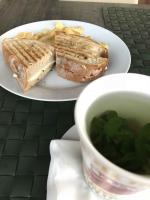 In Cape Verde, the sandwich is not making significant inroads. It continues to be foreign, prepared fresh and appreciated by tourists and in a restricted circle of young middle-class professionals. This must be understood within the social and economic context. The following discusses whether or not the sandwich stands a chance in the Atlantic. It looks at the history and current development of Cape Verde, focuses on food issues, and explores how the sandwich fits in.
In Cape Verde, the sandwich is not making significant inroads. It continues to be foreign, prepared fresh and appreciated by tourists and in a restricted circle of young middle-class professionals. This must be understood within the social and economic context. The following discusses whether or not the sandwich stands a chance in the Atlantic. It looks at the history and current development of Cape Verde, focuses on food issues, and explores how the sandwich fits in.
To read
24.11.2018 | by Kaian Lam
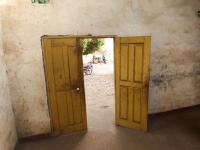 Streams of water trickle from the cotton sacks packed onto the truck, on a high wall. The load no longer weighs only eight tons, it weighs much more, but the accounts are settled, so it doesn’t matter. In my sweater, in my socks, the cotton fibres intertwine with threads of oil. If the truth is light and lies are as heavy as lead, the truck, wobbling at five miles an hour down the steep road, is carrying a great load of lies. But perhaps it is the opposite, that lies are light and the truth is heavy. In the eight hours I spent in the village, the price of a barrel of oil fell by a dollar.
Streams of water trickle from the cotton sacks packed onto the truck, on a high wall. The load no longer weighs only eight tons, it weighs much more, but the accounts are settled, so it doesn’t matter. In my sweater, in my socks, the cotton fibres intertwine with threads of oil. If the truth is light and lies are as heavy as lead, the truck, wobbling at five miles an hour down the steep road, is carrying a great load of lies. But perhaps it is the opposite, that lies are light and the truth is heavy. In the eight hours I spent in the village, the price of a barrel of oil fell by a dollar.
Mukanda
24.11.2018 | by Paulo Faria
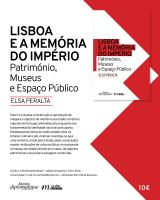 Its purpose is to analyse the several examples by which “images” related to the imperial history of Portugal are built and copied, thus being understood as a fundamental and articulating axis of the Portuguese national identity. The focus is therefore on a “image-memory” or a memory-representation, authorized by the State, by its corporation and by institutions of public culture and not so much on a memory-routine, passed on in the realm of daily social interactions, or a memory-remembrance, passed on verbally.
Its purpose is to analyse the several examples by which “images” related to the imperial history of Portugal are built and copied, thus being understood as a fundamental and articulating axis of the Portuguese national identity. The focus is therefore on a “image-memory” or a memory-representation, authorized by the State, by its corporation and by institutions of public culture and not so much on a memory-routine, passed on in the realm of daily social interactions, or a memory-remembrance, passed on verbally.
City
20.11.2018 | by Elsa Peralta
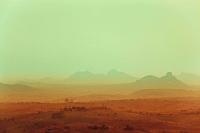 On the contrary, myth derives from oral traditions and has its roots in the fantastic. At the same time, although myth does not need reality to acquire meaning, it does maintain some contact with experience and the world, as a kind of reality-in-disguise.
On the contrary, myth derives from oral traditions and has its roots in the fantastic. At the same time, although myth does not need reality to acquire meaning, it does maintain some contact with experience and the world, as a kind of reality-in-disguise.
To read
12.11.2018 | by Roberto Vecchi
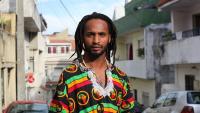 The new case, currently being heard in court, rejects the version of events previously offered by the police officers, and charges them with physical assault, aggravated kidnapping, inhumane treatment and inciting racially-motivated discrimination, hatred and violence - as well as slander, falsifying witness testimonies and falsifying documentation.
The new case, currently being heard in court, rejects the version of events previously offered by the police officers, and charges them with physical assault, aggravated kidnapping, inhumane treatment and inciting racially-motivated discrimination, hatred and violence - as well as slander, falsifying witness testimonies and falsifying documentation.
Body
05.11.2018 | by Ana Naomi de Sousa
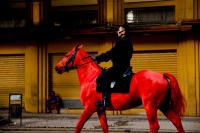 When history and duties to memory are ignored, truth can easily be thought of as a personal choice. Once accommodated in powerful discourse, these “truths” assume impunity: often disregarded and rarely condemned, even though they represent hate speech. Hatred has been normalized and has propelled a radicalism in which “good” struggles against “evil.” In this dichotomy, evil is once again the ‘other’. A discourse that does not humanize the ‘other’ authorizes barbarism – as we have seen in the post-election reactions
When history and duties to memory are ignored, truth can easily be thought of as a personal choice. Once accommodated in powerful discourse, these “truths” assume impunity: often disregarded and rarely condemned, even though they represent hate speech. Hatred has been normalized and has propelled a radicalism in which “good” struggles against “evil.” In this dichotomy, evil is once again the ‘other’. A discourse that does not humanize the ‘other’ authorizes barbarism – as we have seen in the post-election reactions
To read
05.11.2018 | by Fernanda Vilar
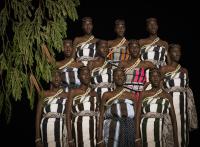 The societies in which we live at different latitudes are legacies of colonialism and constituted by imperial ruins. Depending on our skin colour, social class, academic background and where we live, we can inherit privilege – by benefitting directly or indirectly from the wealth European exploration accumulated – or we can inherit, even accumulate, the oppression of institutional racism and be exposed to inequality and racist colonial violence.
The societies in which we live at different latitudes are legacies of colonialism and constituted by imperial ruins. Depending on our skin colour, social class, academic background and where we live, we can inherit privilege – by benefitting directly or indirectly from the wealth European exploration accumulated – or we can inherit, even accumulate, the oppression of institutional racism and be exposed to inequality and racist colonial violence.
To read
04.11.2018 | by Bruno Sena Martins
 Ana Maria Garcia Nolasco da Silva
Member of the Research Unit in Design and Communication (UNIDCOM) of the Creative University of Lisbon (IADE-U) and of the Centre for Comparative Studies (CEC) of the University of Lisbon.
analascosapopt@gmail.com
In the same way each re-invents his own childhood by creating a narrative – one out of many possible others – with which he identifies in the present moment, so can it be said that national identities are continuously created retroactively though discourse, of which their citizens are active participants.
Ana Maria Garcia Nolasco da Silva
Member of the Research Unit in Design and Communication (UNIDCOM) of the Creative University of Lisbon (IADE-U) and of the Centre for Comparative Studies (CEC) of the University of Lisbon.
analascosapopt@gmail.com
In the same way each re-invents his own childhood by creating a narrative – one out of many possible others – with which he identifies in the present moment, so can it be said that national identities are continuously created retroactively though discourse, of which their citizens are active participants.
To read
18.10.2018 | by Ana Nolasco